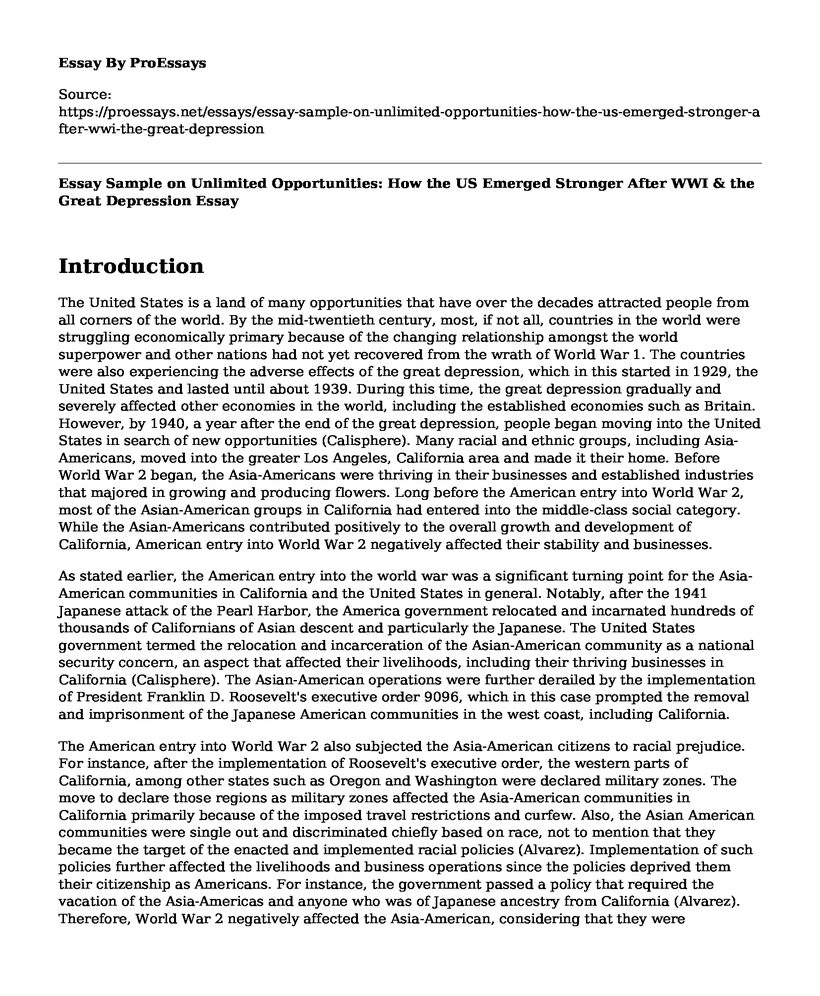Introduction
The United States is a land of many opportunities that have over the decades attracted people from all corners of the world. By the mid-twentieth century, most, if not all, countries in the world were struggling economically primary because of the changing relationship amongst the world superpower and other nations had not yet recovered from the wrath of World War 1. The countries were also experiencing the adverse effects of the great depression, which in this started in 1929, the United States and lasted until about 1939. During this time, the great depression gradually and severely affected other economies in the world, including the established economies such as Britain. However, by 1940, a year after the end of the great depression, people began moving into the United States in search of new opportunities (Calisphere). Many racial and ethnic groups, including Asia-Americans, moved into the greater Los Angeles, California area and made it their home. Before World War 2 began, the Asia-Americans were thriving in their businesses and established industries that majored in growing and producing flowers. Long before the American entry into World War 2, most of the Asian-American groups in California had entered into the middle-class social category. While the Asian-Americans contributed positively to the overall growth and development of California, American entry into World War 2 negatively affected their stability and businesses.
As stated earlier, the American entry into the world war was a significant turning point for the Asia-American communities in California and the United States in general. Notably, after the 1941 Japanese attack of the Pearl Harbor, the America government relocated and incarnated hundreds of thousands of Californians of Asian descent and particularly the Japanese. The United States government termed the relocation and incarceration of the Asian-American community as a national security concern, an aspect that affected their livelihoods, including their thriving businesses in California (Calisphere). The Asian-American operations were further derailed by the implementation of President Franklin D. Roosevelt's executive order 9096, which in this case prompted the removal and imprisonment of the Japanese American communities in the west coast, including California.
The American entry into World War 2 also subjected the Asia-American citizens to racial prejudice. For instance, after the implementation of Roosevelt's executive order, the western parts of California, among other states such as Oregon and Washington were declared military zones. The move to declare those regions as military zones affected the Asia-American communities in California primarily because of the imposed travel restrictions and curfew. Also, the Asian American communities were single out and discriminated chiefly based on race, not to mention that they became the target of the enacted and implemented racial policies (Alvarez). Implementation of such policies further affected the livelihoods and business operations since the policies deprived them their citizenship as Americans. For instance, the government passed a policy that required the vacation of the Asia-Americas and anyone who was of Japanese ancestry from California (Alvarez). Therefore, World War 2 negatively affected the Asia-American, considering that they were discriminated, deprived their citizenship, and worse still, evacuated from California among other states.
Conclusion
Overall, the American entry into the world negatively affected the Asia-American in California. During that period, the Asia-American community and people of Japanese ancestry were discriminated, deprived their citizenship, and evacuated from California, an aspect that affected their businesses and industries.
Works Cited
Alvarez, Luis. "On Race, Riots, And Infrapolitics In Wartime Los Angeles". Www.Cairn.In, 2012, Subject: Human Resource Management Topic: Diversity in the workplace Paper details: Has to be done on the company Pepsi co. I provided the assignment sheet and an example for the paper. Accessed 6 Dec 2019.
Calisphere. "Asian Americans: World War II". Calisphere, 2019, https://calisphere.org/exhibitions/54/asian-americans-world-war-ii/.
Cite this page
Essay Sample on Unlimited Opportunities: How the US Emerged Stronger After WWI & the Great Depression. (2023, Mar 12). Retrieved from https://proessays.net/essays/essay-sample-on-unlimited-opportunities-how-the-us-emerged-stronger-after-wwi-the-great-depression
If you are the original author of this essay and no longer wish to have it published on the ProEssays website, please click below to request its removal:
- Relevance of Ghosts of Abu Ghraib with Respect to the Military Police and Interrogators Who Participated
- Film Analysis Essay on Two Greatest Wars in World History: WW I and WW Ii
- Essay Sample on Issues Caused by Vietnam War
- Edith Cavell: Service to Humanity and Peaceful Coexistence - Essay Sample
- Article Analysis Essay on "The Life of Julius Caesar"
- The Second Industrial Revolution: Expanded Markets, Investment, and Labor - Essay Sample
- Essay Example on Sociology & Holocaust/Genocide: A Complex Relation







